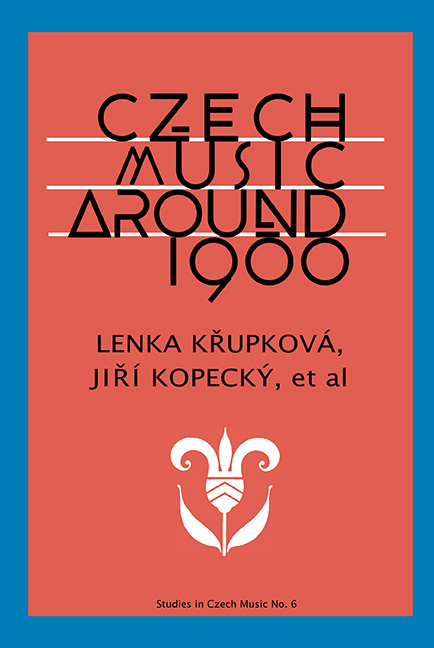Book contents
- Frontmatter
- Table of Contents
- Introductory Remarks on the Conception of This Book
- Flowers in the Graveyard, Tombstones in the Garden
- The “Other World” of Music at the Turn of the Century
- In the Footsteps of Tradition: The Spirit of Romanticism
- Czech Music at the Heart of European Music round 1900
- Novák as an Axial Figure in Czech Music
- Novák's Reception Abroad
- Josef Suk, Dvořák's Favorite Pupil
- Fibich's Path to Success in Prague's National Theater
- Tchaikovsky, Charpentier and the Formation of Janáček's Mature Operatic Style
- Josef Bohuslav Foerster's Lyrical Opera Eva and the Tradition of the French Drama lyrique
- Otakar Ostrčil and Mahler's Influence in Prague
- Folk Culture as an Outward Source of Artistic Inspiration: Vítězslav Novák the Tourist
- The Clash with Compositional Issues of European Music
- Index
- List of Illustrations
- About the Authors
- List of Sources Cited
Josef Bohuslav Foerster's Lyrical Opera Eva and the Tradition of the French Drama lyrique
from Czech Music at the Heart of European Music round 1900
- Frontmatter
- Table of Contents
- Introductory Remarks on the Conception of This Book
- Flowers in the Graveyard, Tombstones in the Garden
- The “Other World” of Music at the Turn of the Century
- In the Footsteps of Tradition: The Spirit of Romanticism
- Czech Music at the Heart of European Music round 1900
- Novák as an Axial Figure in Czech Music
- Novák's Reception Abroad
- Josef Suk, Dvořák's Favorite Pupil
- Fibich's Path to Success in Prague's National Theater
- Tchaikovsky, Charpentier and the Formation of Janáček's Mature Operatic Style
- Josef Bohuslav Foerster's Lyrical Opera Eva and the Tradition of the French Drama lyrique
- Otakar Ostrčil and Mahler's Influence in Prague
- Folk Culture as an Outward Source of Artistic Inspiration: Vítězslav Novák the Tourist
- The Clash with Compositional Issues of European Music
- Index
- List of Illustrations
- About the Authors
- List of Sources Cited
Summary
Josef Bohuslav Foerster (1859-1951) came from a musical family. His father Josef Förster taught music theory at the organists’ school in Prague and was music director at the church of St. Vojtěch (St. Adalbert), where from 1874 to 1877 the organist was Antonín Dvořák. During his long lifetime J. B. Foerster met many leading figures in both Czech and international musical culture; his literary works and the papers from his estate offer valuable testimony concerning Bedřich Smetana, Antonín Dvořák, Pyotr Ilyich Tchaikovsky, Edvard Grieg, and especially Gustav Mahler. Foerster was an outstanding organist, composer, and writer about music. His best musical works are probably those from the last decade of the nineteenth century and the beginning of the twentieth, extending to the outbreak of World War I. A major factor in the course of his life was his marriage to the soprano Berta Lautererová of Prague's National Theater, who was hired by Mahler for the opera in Hamburg where she sang from 1893 to 1901, then later for the Court Opera in Vienna, 1901-13. Foerster worked as a music critic for both Czech and German periodicals, and taught at conservatoires as well as privately. He continually followed happenings in the Czech lands and saw to it that his works were performed in Prague.
Foerster was a popular composer of songs, because he was able to capture sensitively the poetic nuances of poems and at the same time achieve proper rhythmic declamation of their texts, in both Czech and German. He was also fond of the genre of concert melodrama. His supreme song cycle Milostné písně (Love Songs) with orchestra, Op. 96, to words by Rabindranath Tagore, comes from 1914. His choruses, especially those for male voices, retain a place in concert repertoire to this day. Outstanding among his symphonic works are the Symphony No. 3, performed by Mahler in Hamburg in 1896, and Symphony No. 4, Easter, premiered in Prague in 1905. He wrote numerous concertos and solo sonatas. Also copious is his output for piano. Noteworthy among his chamber works is a wind quintet from 1909. For the theater he wrote incidental music as well as six operas, of which the best is probably Eva.
- Type
- Chapter
- Information
- Czech Music around 1900 , pp. 185 - 206Publisher: Boydell & BrewerPrint publication year: 2017

